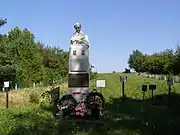Pechora concentration camp
Pechora (also Pechera or Pecioara; Russian: Печера or Печора) was a concentration camp operated by Romania during World War II in the village of Pechora, now in Ukraine.
The concentration camp was established on the gated grounds of what had been a private estate of the Polish noble Potocki family on the banks of the Southern Bug river, which was converted into a sanatorium for tuberculosis patients after the Russian revolution.[1]
The camp was located in the Romanian zone of occupation of Ukraine. Beginning in November 1941, Jews from the surrounding regions, including Tulchyn, Bratslav, Shpikov, Tostyanets, as well as more distant regions, were brought to Pechora to perish in the enclosed grounds.[2] [3] At the camp, prisoners were murdered not through systematic extermination by gas, but rather through starvation, thirst, and exposure to the elements.
No photos of the camp in operation are currently available, though survivor testimonies are.[4]
Although estimates vary, it is believed that as many as 35,000 prisoners were killed at the camp.[5] By the time the camp was liberated by the Red Army on March 17, 1944, no more that 300-400 people were left alive. A mass grave is located at the nearby Jewish cemetery.[6]
Today, the grounds of the former estate are known as "Pechera Park" and are open to visitors, while the main administrative building on the grounds operates as a hospital. There are relatively few reminders of its sinister role during the war. A few memorial plaques have been erected on the grounds, while a more extensive monument and additional memorial stones stand at the site of the mass graves at the Jewish cemetery.[7]
Gallery
 Main administrative building at the property
Main administrative building at the property Monument at the mass graves, Jewish cemetery
Monument at the mass graves, Jewish cemetery Monument at the mass graves, Jewish cemetery
Monument at the mass graves, Jewish cemetery Monument at the mass graves, Jewish cemetery
Monument at the mass graves, Jewish cemetery Monument at the mass graves, Jewish cemetery
Monument at the mass graves, Jewish cemetery Monument at the mass graves, Jewish cemetery
Monument at the mass graves, Jewish cemetery Monument at the mass graves, Jewish cemetery
Monument at the mass graves, Jewish cemetery
References
- Golbert, Rebecca (January 1, 2004). "Holocaust Sites in Ukraine: Pechora and the Politics of Memorialization". Holocaust and Genocide Studies. 18 (2): 205–233. doi:10.1093/hgs/dch062.
- Carp, Matatias (2000). Holocaust in Rumania: Facts and Documents on the Annihilation of Rumania's Jews-1940-44 (PDF). Safety Harbor, FL. ISBN 0966573471.
- Kruglov, A.I. (2004). Chronology of the Holocaust in Ukraine 1941-1944 (PDF). Zaporozhye, Russia. ISBN 966-685-135-0.
- Bronshtein, Moris (2003). Dead Noose: Interviews with Former Prisoners of the Pechora Concentration Camp (PDF). Walnut Creek, CA. ISBN 978-1-300-91663-5.
- Vinokurova, Faina (1999). "The Holocaust in Vinnitsa Oblast" (PDF). In Weiner, Miriam (ed.). Jewish Roots in Ukraine and Moldova. Routes and Roots Foundation. pp. 332–34. ISBN 0965650812.
- "Pechora: International Jewish Cemetery Project". Retrieved January 28, 2019.
- "Yad Vashem: Untold Stories". Retrieved January 28, 2019.
